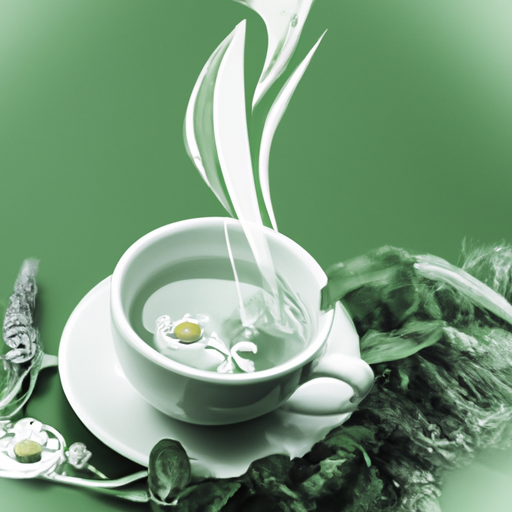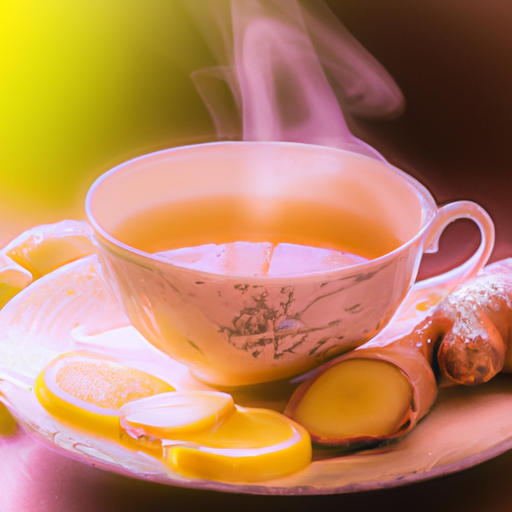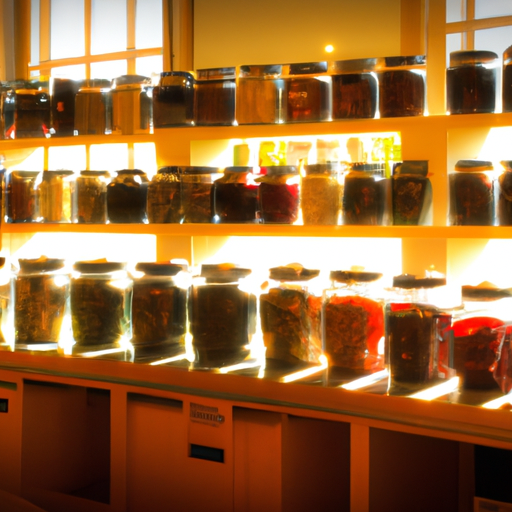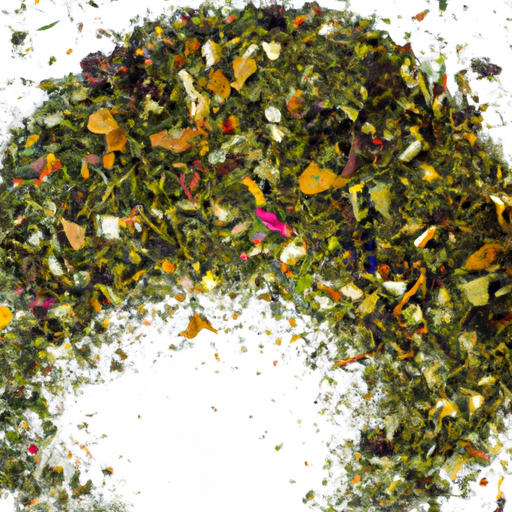In the wise words of Hippocrates, ‘Let food be thy medicine and medicine be thy food.’ It’s a gentle reminder that nature provides us with powerful remedies to heal our bodies, and when it comes to digestive issues, herbal teas can work wonders.
As someone who has personally experienced the discomfort of digestive troubles, I understand the importance of finding a natural solution that nurtures both body and soul.
In this article, I will delve into the world of herbal teas and explore which ones are best suited for soothing digestive issues. From the refreshing and invigorating peppermint tea to the calming and gentle chamomile tea, there are a variety of options that can help ease bloating, indigestion, and other discomforts.
We will also explore the benefits of ginger tea, known for its anti-inflammatory properties, and fennel tea, which aids in digestion and reduces gas.
So, join me on this holistic journey as we discover the healing powers of herbal teas and find the perfect blend to soothe your digestive woes. Together, let’s embrace Mother Nature’s gifts and restore balance to our bodies, naturally.
Key Takeaways
- Peppermint tea is beneficial for relieving bloating, gas, and indigestion, as well as stimulating bile flow and soothing the stomach.
- Chamomile tea is anti-inflammatory and can soothe an irritated stomach lining, reducing inflammation, bloating, gas, and cramping.
- Ginger tea calms an upset stomach, reduces inflammation, boosts digestion, and relieves menstrual cramps.
- Dandelion root tea promotes healthy digestion, stimulates bile production, and is beneficial for indigestion and bloating.
Peppermint Tea
If you’re looking for a natural remedy to soothe your digestive issues, peppermint tea is the go-to choice for you! Peppermint tea is known for its numerous benefits when it comes to digestion. The natural compounds found in peppermint leaves, such as menthol, have been proven to relax the muscles of the gastrointestinal tract, helping to relieve symptoms like bloating, gas, and indigestion.
Additionally, peppermint tea can help to stimulate bile flow, which aids in the digestion of fats. It also has a soothing effect on the stomach, making it a great option for those with stomachaches or nausea.
However, it’s important to note that peppermint tea may not be suitable for everyone. Some people may experience side effects such as heartburn or allergic reactions. It’s always a good idea to start with a small amount and see how your body reacts before consuming larger quantities. If you have a history of gallstones or acid reflux, it’s best to consult with a healthcare professional before incorporating peppermint tea into your routine.
Now, let’s move on to the next herbal tea that can help with digestive issues – chamomile tea.
Chamomile Tea
Chamomile tea is incredibly soothing and can work wonders for calming an upset stomach. It’s been used for centuries to promote relaxation and treat various digestive issues. The benefits of chamomile tea include reducing inflammation, relieving muscle spasms, and aiding in digestion.
This gentle herbal tea contains compounds that can help relax the muscles of the gastrointestinal tract, which can ease discomfort and promote healthy digestion.
One of the main reasons chamomile tea is effective for digestive issues is its anti-inflammatory properties. It can help reduce inflammation in the digestive system, which can alleviate symptoms such as bloating, gas, and cramping. Additionally, chamomile tea can help soothe an irritated stomach lining, making it a great option for those suffering from gastritis or acid reflux.
While chamomile tea is generally safe for most people, it’s important to be aware of potential side effects. Some individuals may experience allergic reactions, particularly if they’re allergic to plants in the daisy family. Additionally, chamomile may interact with certain medications, so it’s always best to consult with a healthcare professional before adding it to your routine.
Transitioning to the next section about ginger tea, this spicy herbal beverage is also known for its digestive benefits.
Ginger Tea
Transitioning to the next section, ginger tea is a fiery elixir renowned for its stomach-soothing properties. This herbal tea has been used for centuries to alleviate digestive issues and promote overall well-being.
Here are some of the health benefits of ginger tea:
-
Calms an upset stomach: Ginger tea can help relieve nausea, bloating, and indigestion. It works by relaxing the muscles in the digestive system, allowing food to move more smoothly.
-
Reduces inflammation: The anti-inflammatory properties of ginger can help reduce inflammation in the gut, soothing symptoms of conditions like irritable bowel syndrome (IBS) and ulcerative colitis.
-
Boosts digestion: Ginger tea stimulates the production of digestive enzymes, aiding in the breakdown and absorption of nutrients.
-
Relieves menstrual cramps: Ginger has been shown to help alleviate the pain and discomfort associated with menstrual cramps.
To make ginger tea at home, follow these simple steps:
-
Peel and grate a fresh ginger root.
-
Boil water in a pot and add the grated ginger.
-
Let it simmer for about 10 minutes.
-
Strain the tea and add honey or lemon for flavor, if desired.
Transitioning to the subsequent section about fennel tea, this herbal remedy is another excellent option for promoting healthy digestion.
Fennel Tea
Fennel tea is a wonderful herbal remedy that can help alleviate gas and bloating. It’s been used for centuries to soothe the digestive system and promote healthy digestion. With its natural properties, fennel tea can also provide relief from constipation. It’s a great option for those seeking natural remedies for digestive issues.
Alleviates Gas and Bloating
Peppermint tea is a lifesaver when it comes to soothing digestive discomfort, providing quick relief from pesky gas and bloating. Here are some discussion ideas about alleviating gas and bloating:
-
Dietary changes for reducing bloating: Incorporating fiber-rich foods, such as fruits, vegetables, and whole grains, can help regulate digestion and prevent bloating.
-
Natural remedies for relieving gas: Alongside peppermint tea, ginger tea is another herbal option that aids in digestion and reduces gas. Chamomile tea can also be beneficial, as it has anti-inflammatory properties that soothe the digestive system.
-
Avoiding carbonated beverages and chewing gum: These habits can introduce excess air into the digestive system, leading to gas and bloating.
-
Practicing mindful eating: Eating slowly, chewing thoroughly, and avoiding overeating can promote better digestion and minimize gas and bloating.
Transitioning into the subsequent section about relieving constipation, it’s important to explore how herbal teas can offer relief in this area as well.
Relieves Constipation
If you’re feeling a bit backed up, relieving constipation can be made easier with the help of some natural remedies. Herbal teas have long been used to address digestive issues, including constipation. Not only do these teas provide relief, but they also promote overall digestive health. Here are some herbal remedies for constipation and natural ways to improve digestion:
| Herbal Tea | Benefits | How to Prepare |
|---|---|---|
| Peppermint Tea | Relieves gas and bloating | Steep 1 tsp of dried leaves |
| Ginger Tea | Soothes and stimulates the stomach | Boil 1 cup of water with ginger slices |
| Dandelion Root Tea | Acts as a gentle laxative | Steep 1-2 tsp of dried root |
| Chamomile Tea | Calms the digestive system | Steep 2-3 tsp of dried flowers |
By incorporating these herbal remedies into your routine, you can naturally improve your digestion and find relief from constipation. Now, let’s move on to discussing the benefits of lemon balm tea.
Lemon Balm Tea
I’ve found that Lemon Balm Tea is a wonderful herbal remedy for reducing cramps and spasms in the digestive system. It has a calming effect on the muscles, helping to ease discomfort and promote relaxation.
Not only does Lemon Balm Tea aid in digestion, but it also helps to soothe the mind and promote a sense of overall well-being.
Reduces Cramps and Spasms
Choose a herbal tea that eases cramps and spasms, soothing your digestive system and providing relief. Here are three reasons why lemon balm tea is the perfect choice for reducing cramps and spasms:
-
Reduces Menstrual Cramps: Lemon balm tea has been used for centuries to alleviate menstrual cramps. It’s calming properties help relax the muscles in the uterus, providing relief from the pain and discomfort associated with menstruation.
-
Eases Stomachaches: Whether it’s from indigestion, gas, or an upset stomach, lemon balm tea can help ease the pain. Its antispasmodic properties help relax the digestive muscles, reducing cramps and soothing stomachaches.
-
Promotes Relaxation and Digestion: In addition to reducing cramps and spasms, lemon balm tea also promotes relaxation and aids digestion. Its natural compounds help calm the mind and body, allowing for better digestion and overall well-being.
By choosing lemon balm tea, you can find relief from cramps and spasms while promoting relaxation and digestion.
Promotes Relaxation and Digestion
Kick back and relax with a cup of lemon balm tea, also known as the ultimate stress-buster and tummy-tamer. This herbal tea promotes relaxation and aids digestion, making it the perfect remedy for those with digestive issues.
Lemon balm has been used for centuries to calm the mind and soothe the stomach. Its natural properties help to relax the muscles of the digestive tract, reducing bloating, cramping, and discomfort. Not only does it provide relief from digestive issues, but it also has a calming effect on the body, helping to alleviate stress and promote a sense of well-being.
So, sit back, sip on a warm cup of lemon balm tea, and let its soothing properties work their magic on your digestive system.
Speaking of digestive health, let’s move on to the next herbal tea, dandelion root tea.
Dandelion Root Tea
Dandelion Root Tea is the ultimate herbal remedy for digestive issues. It’s made from the root of the dandelion plant and has been used for centuries to promote healthy digestion. Dandelion root is rich in vitamins and minerals, including vitamin A, vitamin C, and potassium, which are essential for maintaining a healthy digestive system.
One of the main benefits of dandelion root tea is its ability to stimulate the production of bile, a substance that helps break down fats and aids in digestion. This can be especially beneficial for those who struggle with indigestion or bloating after meals. Additionally, dandelion root tea has diuretic properties that can help alleviate water retention and reduce bloating.
To make dandelion root tea, simply steep one tablespoon of dried dandelion root in a cup of hot water for about 10 minutes. You can add honey or lemon for taste if desired. It’s recommended to drink this tea before or after meals to maximize its digestive benefits.
Dandelion root tea is a natural and effective remedy for digestive issues. Its numerous benefits, including improved bile production and reduction of bloating, make it an ideal choice for those seeking relief.
Next, let’s explore the benefits of licorice root tea.
Licorice Root Tea
After learning about the amazing benefits of Dandelion Root Tea for digestive issues, I was intrigued to explore another natural remedy that could provide relief. That’s when I discovered Licorice Root Tea.
Licorice root has been used for centuries in traditional medicine for its numerous health benefits. When it comes to digestive issues, licorice root has been found to soothe and heal the lining of the stomach and intestines, making it an excellent choice for individuals suffering from ulcers, heartburn, or indigestion.
Not only does it help reduce inflammation in the digestive tract, but it also promotes the production of healthy mucous, which can protect the lining from further damage.
However, it’s important to note that licorice root should be consumed in moderation as it contains a compound called glycyrrhizin, which can cause high blood pressure and low potassium levels if consumed excessively. Additionally, some individuals may experience minor side effects like headaches or water retention. It’s always advisable to consult with a healthcare professional before incorporating licorice root tea into your daily routine, especially if you have any pre-existing medical conditions.
Licorice root tea can be a beneficial herbal remedy for digestive issues. Just remember to enjoy it in moderation and consult with a healthcare professional to ensure it’s safe for you.
Frequently Asked Questions
Are there any potential side effects or interactions to be aware of when using herbal teas for digestive issues?
When using herbal teas for digestive issues, it is important to be aware of potential risks and herb-drug interactions. These can vary depending on the specific herbs used, so it’s best to consult with a healthcare professional.
Can herbal teas be used as a long-term solution for digestive issues, or are they more effective as a short-term remedy?
Herbal teas can provide short-term relief for digestive issues, acting like a soothing balm. However, their long-term effectiveness varies depending on the individual’s condition. It’s important to consult with a healthcare professional for a holistic approach to digestive health.
How quickly can I expect to see results from drinking herbal teas for digestive issues?
Results from drinking herbal teas for digestive issues vary depending on individual factors. Long-term use may pose potential risks. Factors such as overall health, diet, and lifestyle can affect the effectiveness of herbal teas.
Are there any specific guidelines or recommendations for the best way to prepare and consume herbal teas for digestive issues?
When it comes to preparing herbal teas for digestive issues, it’s important to follow some guidelines. It’s recommended to steep the herbs in hot water for about 10 minutes and consume the tea 2-3 times a day.
Can I combine different herbal teas together to enhance their effects on digestive issues, or should they be used individually?
Combining herbal teas can enhance their effects on digestive issues, but it’s important to consider potential side effects and interactions. Taking a holistic approach and consulting with a healthcare professional can help ensure a natural and safe experience.
Conclusion
In conclusion, when it comes to choosing the best herbal tea for digestive issues, there are several options available. Peppermint tea is great for soothing the stomach and relieving bloating. Chamomile tea helps with indigestion and promotes relaxation. Ginger tea aids in digestion and reduces nausea. Fennel tea is known for its ability to reduce gas and bloating. Lemon balm tea calms the digestive system and promotes healthy digestion. Dandelion root tea helps with detoxification and liver health. Lastly, licorice root tea soothes the digestive tract and reduces inflammation.
While each tea offers its unique benefits, it’s important to consult with a healthcare professional to determine the best option for your specific needs. Don’t let digestive issues hold you back from living a vibrant and healthy life. Try incorporating one of these natural remedies into your daily routine and experience the soothing effects firsthand. Remember, nature has provided us with incredible solutions to support our well-being.










